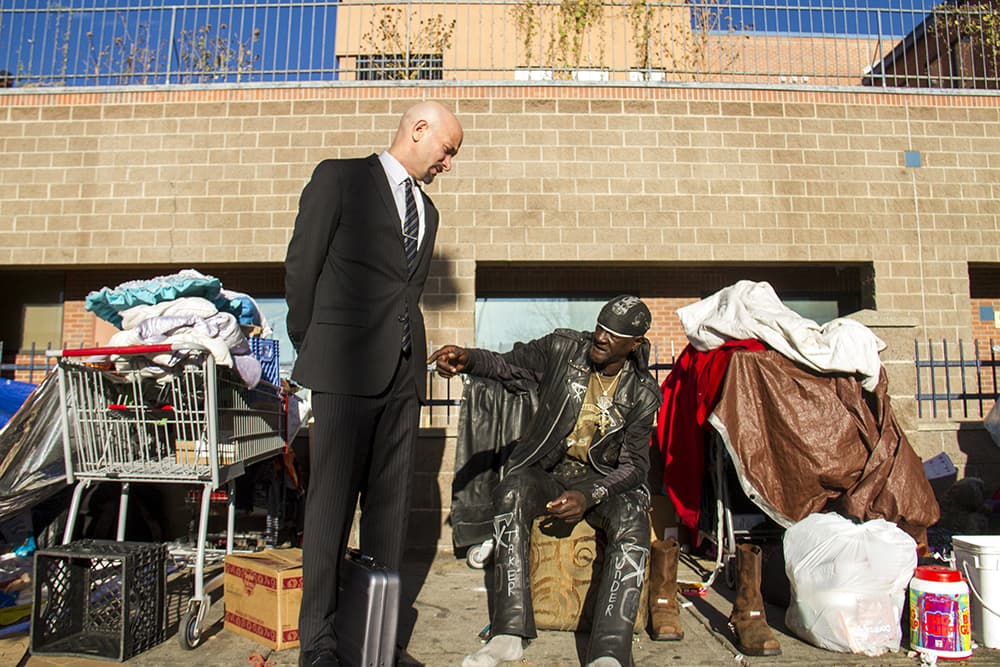
The city of Denver is likely to go to trial this year to defend its treatment of people experiencing homelessness, according to the man suing them on behalf of thousands of people experiencing homelessness.
"The procedural obstacles are out of the way. After two years of fighting, scratching, and clawing, we made it," said Jason Flores-Williams.
With the latest legal developments, the case is likely to go to trial in 2018, Flores-Williams said -- and it's remarkable even for making it this far.
The plaintiffs collectively represent a class of about 5,500 people who live on Denver's streets. They claim that the city government has violated their constitutional rights, specifically referring to the way police and other service workers seize belongings during sweeps of encampments.
What does a sweep look like?
Pre-trial evidence described one of the first notable sweeps, on March 8 and 9, 2016. Police joined public works employees and people on work-release from the jail to conduct an operation in Triangle Park, where the city had received complaints of violence and illicit drug sales.
But the two sides differ vastly on what happened next. The plaintiffs claimed that people were given a "very short time" to gather their items and leave the area before the city crew "indiscriminately bagged up some items for storage and threw others (including valuable personal items) into garbage trucks," according to a judge's recent order in the case.
The city countered "that it gave homeless persons plenty of time to gather their belongings" and that it carefully sorted the items, the judge wrote. The belongings were stored for 60 days, and four people retrieved their property. Three others could not find their items at the storage facility.
City staff claim that they always put up signs and give verbal warnings ahead of sweeps, though the plaintiffs have disputed that in some cases. In some cases, police reportedly threatened to enforce the city's camping ban.
Details of the case:
The suit argues that this behavior is a violation of the Fourth Amendment, which prohibits unreasonable search and seizure without a warrant, the Eighth Amendment, which prohibits cruel and unusual punishment, and the Fourteenth Amendment, which guarantees equal protection under the law and due process.
"I can't imagine sleeping on a street and you’re exhausted and the government comes and stands over you, takes your stuff, throws it away," Flores-Williams said in an interview. "It's a reckoning for everyone who's experienced this."
City officials say the government only disposes of belongings if they aren't claimed by their owners. "We collect and store belongings from encampment clean-ups that folks can come pick up, but if they don’t come grab it after a while, we are forced to get rid of it. They are made aware of this policy," wrote mayoral spokeswoman Amber Miller in an email to Denverite.
"The city’s clean-up efforts address very serious public health concerns for people who live on the streets or who live in homes or work in businesses in the area. With exposed food, used needles and feces or other human waste in these encampments, the areas quickly became unsafe and unsanitary," she added in a separate statement.
She noted that the city "cares deeply for people experiencing homelessness," and said that the city spends up to $50 million yearly to "shelter, feed, train, employ, house and otherwise positively support those experiencing homelessness."
What's next?
On Monday, the judge in the case dismissed both the plaintiffs' and the government's requests for summary judgment, which can end the case before it goes to trial. The judge, William J. Martinez, also dismissed the city's request to strike some of the plaintiffs' evidence.
The early-stage fight included arguments about whether plaintiffs' statements should be disallowed because they didn't sign their paperwork manually or didn't show up for a deposition.
Flores-Williams now expects the trial to happen within six to eight months and to last three weeks. He expects "a ton" of people to tell their stories. He is joined in the case by attorneys David Lane and Andrew McNulty.
"We’ve got to build an infrastructure where all of the homeless who are going to be testifying can come to Denver. We may go so far as renting an apartment," the attorney said.
The plaintiffs aren't seeking financial damages. Instead, they want the judge to forbid the city from continuing the alleged behavior.













